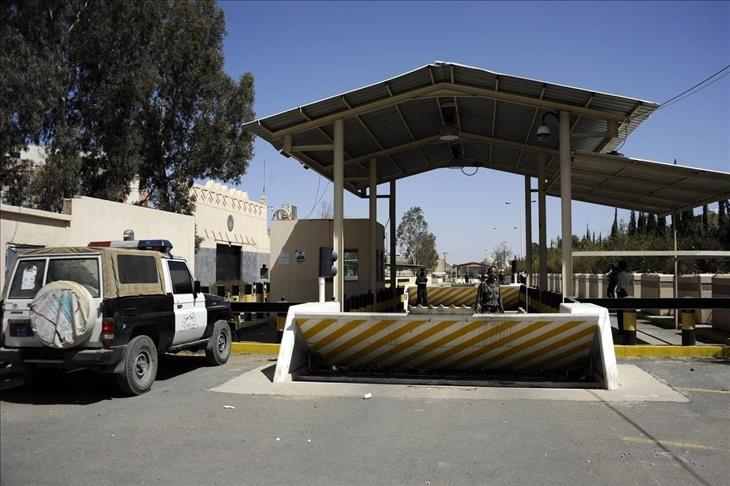Experts ponder goals of Arab ground presence in Yemen
The ground operation had initially been scheduled for April 7, but it was delayed for logistical reasons, the diplomat, told The Anadolu Agency

CAIRO
The fresh deployment of Arab ground troops in southern Yemen's strategic city of Aden by a Saudi Arabia-led coalition was 27 days overdue, a western diplomat privy to the operation's blueprint, said Sunday.
"The ground operation had initially been scheduled for April 7, but it was delayed for logistical reasons," the diplomat, told The Anadolu Agency.
According to the source, the coalition's decision to delay the ground operation had been due to the recent eruption of fierce clashes between Shiite Houthi militants and the loyalists of embattled Yemeni President Abd Rabbuh Mansour Hadi near the Port of Aden.
The source said the troops had sailed off to Aden from the Red Sea's Port of Djibouti, bypassing the much nearer Port of Assab in Eritrea, which Saudi Arabia suspects of being Iran's gateway for logistical assistance to the Houthis.
Local sources in Aden, meanwhile, told AA that a "limited" Arab force was deployed in Aden on two stages between Saturday evening and Sunday morning.
The pro-Hadi militants, for their part, said the Arab ground troops joined the pro-Hadi camp in clashes with Houthis over control of Aden International Airport.
The Saudi-led coalition has yet to officially comment on the reported ground operation.
However, the Saudi-owned Al Arabiya news channel quoted coalition spokesman Ahmed al-Asiri as denying the deployment of any ground troops in Yemen.
Motivations
The coalition's deployment of ground troops in Yemen seeks to fulfill military and political purposes, according to the western diplomat.
"From a military standpoint, the purpose is to create a safe zone in Aden to be utilized as a base for Arab troops," the diplomat said.
He added that the operation's political purpose was to secure a foothold for embattled Yemeni President Abd Rabbuh Mansour Hadi and his government to operate inside Yemen as opposed to Saudi capital Riyadh.
Col. Saleh al-Asbahi, a researcher at the Yemeni army's Center for Military Studies, said that Aden held a "crucial" strategic position as a base for expanding a ground operation in Yemen.
"The Saudi coalition will not be able to deploy troops in Yemen's mountainous or desert regions without first taking control of Aden," al-Asbahi told AA.
"Moreover, Aden's network of roads leading to the rest of Yemen's provinces would facilitate future ground incursions into other provinces," he said.
He added that military equipment could be transferred to the coalition's troops through the Port of Aden.
Launching point
Sources have cited more than one reason behind the coalition's selection of Djibouti, whose coast lies 240kms away from the Port of Aden, to be the "launching point" of its ground operation in Yemen.
"Djibouti's coastline is close to that of the largely anti-Houthi Aden," retired Yemeni Colonel Mohsen Khadrouf told AA.
"Moreover, Djibouti hosts American and French military bases with which the coalition is coordinating," he added.
Khadrouf noted that the coalition avoided transferring the troops through Eritrea's Assab Port, which is only 60kms away from Yemen's Red Sea coast, due to Eritrea's suspected involvement in facilitating Iran's support for the Houthis, something that officials in Asmara deny.
Troops
The broader framework for the Saudi-coalition's planned ground incursion in Yemen involves "several thousands" of Arab troops, according to the western diplomat.
The diplomat added that 150 military personnel from the United Arab Emirates, including navy and air force officers as well as "informants,", had landed in Djibouti's Camp Lemonnier military base prior to the ground operation's initial launching date of April 7.
"The Emirati military men are providing guidance for the ground operation due to their knowledge of Yemen's geographic layout as well as the capabilities of the Houthis and troops allied to ex-Yemeni President Ali Abdullah Saleh," the source said.
He went on to say that many of the Emirati military officers currently in Djibouti are originally from southern Yemen and that they had obtained Emirati citizenship after fleeing their home country in the wake of 1993's civil war.
This is the first deployment of Arab ground troops in Yemen since Saudi Arabia and several Arab allies launched a military campaign against the Houthis in Yemen on March 25.
Riyadh says that the offensive was in response to appeals by President Hadi for intervention against the Houthis.
Hadi, who is backed by the Sunni-majority Gulf States, fled to Riyadh in late March, in hopes of reinstating his presidency after failing to establish a seat of government in Aden.
The Houthis, for their part, had denounced the offensive as an unwarranted "Saudi-American onslaught" on Yemen.
Fractious Yemen has remained in turmoil since last September, when Houthi militants overran capital Sanaa and moved to capture several other provinces across the impoverished Arab country.
Gulf States accuse Shiite Iran of supporting the Houthi insurgency in Yemen.
Additional reporting by: Ahmed Abdullah, Ibrahim Saleh, Shoukri Hussein and Hagar al-Dosoki.
Anadolu Agency website contains only a portion of the news stories offered to subscribers in the AA News Broadcasting System (HAS), and in summarized form. Please contact us for subscription options.






